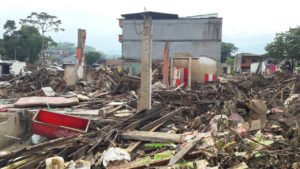Mocoa Disaster Necessitates Widespread Humanitarian Aid
On the morning of April 1, heavy rains caused a mudslide in the Colombian city of Mocoa that, according to El País, caused 279 deaths and over 200 injuries.

El Tiempo reported that the natural disaster left Mocoa, which has a population of almost 40,000, without gas and clean water. Mud and debris continue to block many of the roads leading into and out of the city. El País said that President Juan Manuel Santos declared a state of emergency on April 3.
The Colombian government, according to Dinero, has pledged Mex$1.2 billion ($4.2 million) to the reconstruction of Mocoa’s infrastructure and businesses. Chinese President Xi Jinping announced his government would give $1 million in humanitarian aid. President Donald Trump expressed solidarity with Colombia but has not yet committed to a monetary contribution.
A congressional bill mandating that each representative donate five days of salary to the victims passed the House in less than an hour but has stalled in the Senate, according to Semana.
Conservative Party Senator Juan Carlos Restrepo criticized the bill as a “show,” arguing that personal contributions should be private decisions. Others have proposed alternative congressional aid plans, further contributing to the Senate’s standstill.
Santos has remained heavily involved in Mocoa since the night of the disaster. Semana reported that he traveled to the city to help organize the relief and rescue operations of the soldiers and aid-workers deployed in the area. He has also tweeted frequent updates on the situation, using the hashtag #EstamosConMocoa.
BBC reported that the former-rebel group FARC offered to help rebuild Mocoa. The government has not responded to this proposal yet.
Since the disaster, the news agency of the National University of Colombia announced that hundreds of other municipalities located near rivers could potentially share Mocoa’s fate if Colombia does not take the necessary flood prevention measures.
